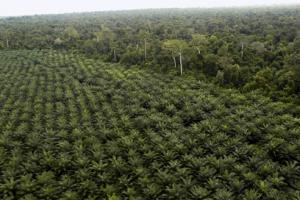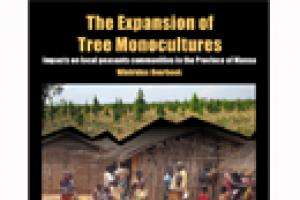On May 18th 2010, a letter to the World Bank representatives has been sent on behalf of more than 80 organizations from more than 34 countries urging the World Bank to stop funding oil palm plantations.
In response to the growing criticism relating to the unsustainability of oil palm plantations, the World Bank decided to suspend its funding for the palm oil sector and to request an audit of its International Finance Corporation (IFC) from the Ombudsman.
Large-Scale Tree Plantations
Industrial tree plantations are large-scale, intensively managed, even-aged monocultures, involving vast areas of fertile land under the control of plantation companies. Management of plantations involves the use of huge amounts of water as well as agrochemicals—which harm humans, and plants and animals in the plantations and surrounding areas.
Action alerts
18 May 2010
LETTER SENT TO THE WORLD BANK:
Dear Sir/Madam,
With reference to the World Bank meeting to be held in San José, Costa Rica on 17th to 18th May 2010, within the framework of a consultation process for the bank’s strategy on palm oil financing, the undersigned would like to express our concern about the possible future involvement of the World Bank in financing oil palm plantations.
Publications
18 May 2010
A field report, by Winfridus Overbeek.
This publication is the result of a visit to Mozambique in November 2009 by two activists involved in the struggle against tree monocultures in the Brazilian state of Espírito Santo. This visit was made possible by the World Rainforest Movement (WRM) with the goal of exchanging experiences about large-scale tree monocultures.
Other information
29 April 2010
On 19 and 20 March this year, peasant, indigenous and quilombola* communities and movements from the States of Espirito Santo and Bahia who are fighting to get back their territory invaded by monoculture eucalyptus plantation companies, paid a visit to Raiz and Vereda Funda in the locality of Rio Pardo in the north of Minas Gerais, in solidarity and to exchange experiences with these two communities struggling to regain their traditional territory.
Other information
29 April 2010
Over the past few decades, oil palm plantations have rapidly spread throughout Asia, Africa and Latin America, where millions of hectares have already been planted and millions more are planned for the next few years. These plantations are causing increasingly serious problems for local peoples and their environment, including social conflict and human rights violations.
Other information
14 April 2010
To: APHIS (Animal and Plant Health Inspection Service)
Montevideo, April 10, 2013
The World Rainforest Movement (WRM) is an international organization, founded in 1987 and based in Uruguay, working on tropical forest and forest-related issues, including industrial tree plantations.
For many years, the WRM has monitored and studied several aspects of the expansion of industrial tree plantations worldwide. One of these is the trend promoted by tree plantation companies to introduce plantations of genetically engineered trees.
Bulletin articles
30 March 2010
There can be no doubt that we are immersed in a long and sometimes resisted process of gender awareness regarding social relationships that in general terms have historically placed women in an unequal and subordinate position.
Other information
30 March 2010
In late 2008, WRM and Friends of the Earth Papua New Guinea/CELCOR jointly organised a workshop with local women in Papua New Guinea. The workshop referred to oil palm plantations that are being mainly promoted to feed the European market with palm oil (used in products such as cosmetics, soap, vegetable oil and foodstuffs) as well as for the production of agrofuels.
Other information
30 March 2010
In a study published recently in Germany on Climate and Development, we find the following statements: “Poverty affects many, too many people – and it affects men and women differently and in different numbers.
Other information
30 March 2010
What is happiness? We can find many answers and we may even consider that being happy is a strictly personal matter. However, at least two aspects of happiness are universal: we all want it and it would be hard to find someone who could declare him/herself happy when confronting hunger, homelessness or when lacking access to the knowledge constructed and accumulated by humanity.
Publications
11 March 2010
Over the past few decades, oil palm plantations have rapidly spread throughout Asia, Africa and Latin America, where millions of hectares have already been planted and millions more are planned for the next few years. These plantations are causing increasingly serious problems for local peoples and their environment, including social conflict and human rights violations.
Bulletin articles
27 February 2010
The last remnants of forests in Bangladesh are disappearing and much of the blame goes to local peoples’ “slash and burn” agriculture. The government –supported with loans and funds from multilateral and bilateral financial institutions- is actively promoting the plantation of trees and would thus appear to be trying to revert the situation.





